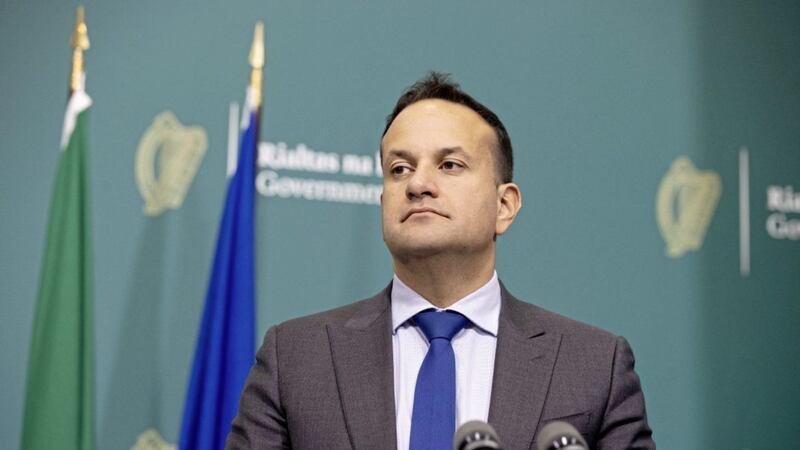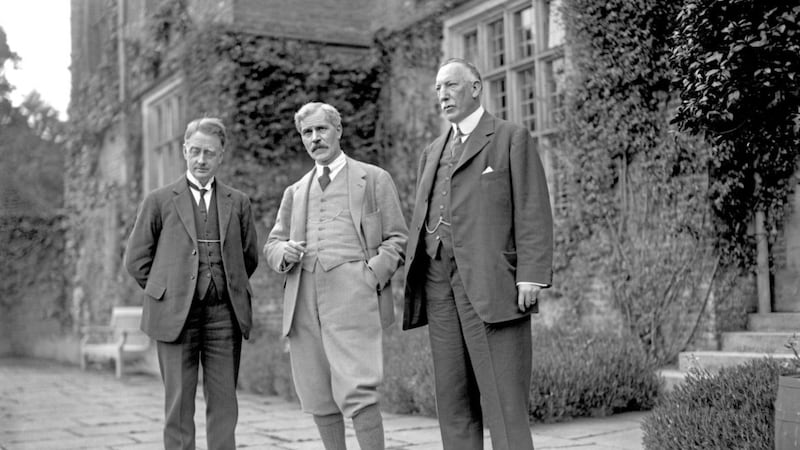TÁNAISTE Leo Varadkar has suggested cross-border travel might have to be restricted over Christmas due to differing Covid rates and policies.
He is a fitting person to raise this possibility. As Taoiseach, he led a government of staggering north-south indifference.
It gave Stormont 10 minutes notice of entering lockdown, later said the people of the Republic needed to hear decisions first, then ignored Stormont pleas for coordination or even a briefing on plans for exiting lockdown, despite a memorandum of understanding.
The current Irish government has handled the latest wave no differently. It has found Northern Ireland useful as an excuse for not closing its airports, at least until it might have to close the border.
However, altering policy or even policy-making slightly in cooperation with Belfast is apparently too ludicrous an idea for anyone in Dublin to contemplate.
**
Boris Johnson is a profoundly unserious leader for serious times, as he demonstrated again this week with comments on Brexit meat product negotiations.
The argument itself is substantial and could drive a sea border solution: the UK wants to mirror EU food safety regulations, which puts Brussels on the spot to ease restrictions between Britain and both parts of Ireland. London is in the rare position of having a reasonable case, as EU and Irish officials have conceded.
Yet in a conference call with worried retailers, Johnson chose to sum this up as "nothing can stop the great British sausage making it to Belfast".
One retailer told the press "there was no detail to back that statement up".
In the classic sitcom Yes, Minister, the lead character becomes prime minister by concocting a claim that Brussels is going to ban the term 'British sausage'.
It is inconceivable that Johnson is unaware of this reference.
**
UUP health minister Robin Swann has announced two public inquiries into separate neurology and urology scandals.
Inquiries are rare, so announcing two is seen as significant. It could also be seen as pointless.
The longest inquiry in Northern Ireland's history, into the deaths of five children in hospitals from hyponatraemia, concluded in 2018 after 14 years.
Inquiry chair Mr Justice O'Hara uncovered so much secrecy, dishonesty and connivance, to the bereaved and to himself, that his central recommendation was for a statutory duty of candour on medical professionals, rather than merely on health organisations - an approach that has already failed to prevent scandals in Britain.
This week the General Medical Council, the body through which doctors officially regulate themselves, rejected O'Hara's recommendation but said a duty of candour on health organisations, as in Britain, would be acceptable.
There is no sign that any part of Northern Ireland's health service has acted on the inquiry report, other than to close ranks even more tightly than before.
**
Pre-schools in Northern Ireland are "highly segregated" despite a perception they are mixed, according to a report from Ulster University.
This feels like the answer to a question nobody needed to ask. If people believe they are mixing, why shatter the illusion?
It is not as if they are missing out on the enriching cultural diversity between Protestant and Catholic three-year-olds.
There is a parallel here with notionally mixed housing, where people proudly believe their new development is a branch of the Corrymeela Centre, until somebody puts a flag up.
Segregated schooling is strongly linked to segregated housing, 'bussing' pupils to address it was a disaster in the United States and relocating households is unthinkable.
So perhaps a better question is how much meaningful integration can be accomplished entirely inside people's heads - while leaving them alone to get on with it.
**
A similar question arises after comments by DUP MLA Maurice Bradley, who told Stormont's education committee all schools in Northern Ireland should merge into a single integrated sector, although not along the current integrated model, with its quota-based double dose of religious 'ethos'.
Such calls by unionists tend to be viewed by nationalists as attacks on Catholic schools, while unionists in turn tend to see the Catholic sector as the obstruction.
So why not stop fretting about what the Catholic sector does? Declare all state schools integrated, widen their curriculum, evict their Protestant Church governors and see how much of this problem sorts itself out.
**
The partitionism was off the charts on Tuesday when Sinn Féin argued in the Dáil for a bill for accountability and transparency on political lobbying while arguing against almost identical legislation in Stormont.
The party had only itself to blame for the laughable timing: it proposed the Dáil debate.
The Stormont bill aimed to put a number of RHI lessons and New Decade, New Approach commitments into law - for example, by requiring accurate minutes of meetings - and also better regulate special advisers.
Although this was most obviously aimed at the DUP, only Sinn Féin opposed it, apparently just because it was put forward by TUV leader Jim Allister, whose 2013 special advisers bill still has republicans seething.
With his latest bill now set to become law, Sinn Féin can console itself that the advice it gets is clearly not that special.








